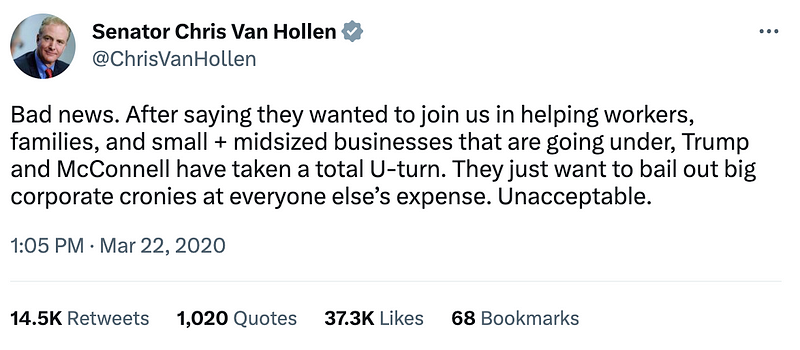How Politicians Exploit Greed for Social Media Engagement
Written on
Chapter 1: Understanding the Outrage Dynamics
You may have noticed that social media tends to amplify feelings of outrage. When users encounter content that provokes anger, they are more inclined to engage with it and share it further. This creates a cycle of outrage, leading to a continuous exchange of insults, accusations, and hostility. Sound familiar?
Recent studies indicate that one specific type of content is particularly effective at driving outrage and engagement: perceptions of greed. For politicians looking to enhance their image among supporters, a strategic approach would be to post a tweet that highlights an opponent's supposed greed.
> What are the effects when a senator tweets about greed?
In a study released in March 2023, researchers from the University of British Columbia analyzed tweets from US senators spanning from 2013 to 2021. They developed a “greed descriptive dictionary,” which included terms like “money-grubbing,” “exploit,” and “extravagant” to scrutinize the language used in these tweets.
The study sought to uncover the relationship between the frequency of tweets discussing greed and the level of engagement those tweets received. Initially, the researchers confirmed that references to greed were often linked to negative emotional responses, a trend consistent across both Democratic and Republican senators. When greed-related terms appeared in a senator's tweet, it typically pointed to some harmful or unethical scenario.
With this emotional backdrop established, the focus shifted to engagement metrics. The findings aligned with expectations: tweets containing greed-related language garnered more likes and retweets.
What was surprising, however, was the strength of greed as a predictor of engagement. The researchers compared greed against 20 other factors previously associated with tweet engagement—such as general negative sentiments, moral outrage, and social issues—and found that greed emerged as the top predictor for likes on senators' tweets. It was also the second strongest predictor for retweets, surpassed only by general negative emotions. In essence, senators who frequently tweeted about greed received the highest levels of engagement.
Section 1.1: Political Party Differences
The data revealed a general correlation between greed and engagement, but the researchers conducted a further analysis to explore variations between Democratic and Republican tweet performance. They assessed whether tweets that mentioned greed performed better than those that did not, uncovering a largely similar trend: politicians from both parties attracted greater engagement when referencing greed.
However, a noteworthy distinction emerged. This was particularly evident in tweets that accused opponents of greed. Such tweets garnered more engagement when posted by Democrats compared to Republicans.
For instance, one of the most widely retweeted posts in the dataset was from Chris Van Hollen, a Democratic senator from Maryland, in 2020:

The analysis indicated that while all politicians benefited from discussing greed, Democrats experienced the most significant advantage when using it to criticize their political rivals.
Section 1.2: The Impact of Social Media Engagement
Based on this evidence, if you’re an aspiring politician looking to amplify your online presence, accusing opponents of greed—particularly as a Democrat—can be an effective strategy.
However, the implications of this research extend beyond the realm of US senators seeking visibility. It sheds light on our interactions with social media and our emotional reactions to online hostility.
Social networks excel at uniting individuals, yet this connection does not always promote individual well-being. Well-crafted messages can incite emotional outbursts among those who may not need to engage deeply, and heightened emotional responses can facilitate the rapid spread of misinformation.
When the situation becomes overwhelming, the best approach is to cultivate greater self-awareness. This can be as straightforward as pausing to reflect on a few questions: How is this affecting my life beyond social media? Am I responding too hastily to this information? Should I invest more time in verifying the facts? Is that person genuinely a greedy villain, or could there be an alternative explanation? Does consuming this content uplift me or bring me down? How can I spend my time more positively today?
The answers to these questions may vary, but consistently asking them is essential to break free from the cycle of outrage that thrives on impulsive reactions.
Ultimately, you have control over how you allocate your mental energy, so don’t surrender your focus to those skilled at capturing it.
Chapter 2: The Role of Media in Shaping Perceptions
This video titled "Jonathan Pie: How Putin Weaponized London's Greed | NYT Opinion" discusses the intricate relationship between power, greed, and social media influence. It highlights how these dynamics play out in the political arena and the implications for public discourse.